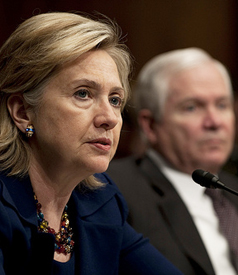Defense Secretary Robert Gates and Secretary of State Hillary Clinton voiced their support for President Obama’s proposed troop escalation in Afghanistan but cautioned Wednesday that a failure may have severe consequences.
“Among a range of difficult choices, this is the best way to protect our nation now and in the future,” said Clinton, testifying before the Senate Armed Services Committee Hearing on Strategy in Afghanistan and Pakistan.
Obama’s plan, to bring 30,000 additional American troops to the region within the next six months, would be predicated on the withdrawal of American troops from Afghanistan by 2011.
Gates, speaking to the committee, warned there would be grave consequences if the administration were to be unsuccessful. “Failure in Afghanistan would mean a Taliban takeover of much, if not most, of the country and likely a renewed civil war,” said Gates. “Taliban-ruled areas could in short order become, once again, a sanctuary for al Qaeda as well as a staging area for resurgent militant groups on the offensive in Pakistan.”
He also highlighted the difference in the Obama administration’s Afghanistan plan to that advocated previously by the Bush administration. “This approach is not open-ended ‘nation-building.’ It is neither necessary nor feasible to create a modern, centralized, Western-style Afghan nation-state – the likes of which has never been seen in that country. Nor does it entail pacifying every village and conducting textbook counterinsurgency from one end of Afghanistan to the other,” he said. “It is, instead, a narrower focus tied more tightly to our core goal of disrupting, dismantling and eventually defeating al Qaeda by building the capacity of the Afghans – capacity that will be measured by observable progress on clear objectives, and not simply by the passage of time.”
Rep. Dana Rohrabacher (R.-Calif.), who opposes the war, called Obama’s strategy as “maybe a different facade, but it’s the same old policy.”
Sen. Russ Feingold (D-Wis.) also expressed skepticism. “Why does it make sense to have a huge ground presence in Afghanistan to deal with a small al Qaeda contingent,” he asked, “when we don’t do that in so many other countries where we’re actually having some success without invading the country and attacking those that are part of al Qaeda? It doesn’t make sense.”
Sen. Carl Levin (D-Mich.), chair of the committee, was skeptical as to whether the proposed troop increase was the best way to facilitate the goal of strengthening the Afghan government’s role in its national defense.
“It seems to me that the large influx of US combat troops will put more US Marines on street corners in Afghan villages, with too few Afghan partners alongside them,” said Levin. “Partnering with, equipping and in other ways empowering Afghan forces to provide security for their country will demonstrate our resolve and commitment to a stable future for Afghanistan and the region. That should be the stated mission, and troop increases should be judged by whether they advance that mission.”
Adm. Mike Mullen, chairman of the Joint Chiefs of Staff, expressed concern for the morale of soldiers, many of whom may be deployed more often, with less time at home, to sustain the troop levels in both Iraq and Afghanistan.
Many legislators also take issue with the proposed pullout date that the $30 billion troop increase is meant to allow.
Sen. John McCain (R-Ariz.) said he is in favor of the troop increase, but thinks that it is a mistake to attempt to set a firm deadline for withdrawal. “We don’t want to sound an uncertain trumpet to our friends in the region,” he said.
Gates also expressed a similar sentiment. “Quite frankly, I detest the phrase ‘exit strategy’ … because we are looking over time at a relationship” with the Afghan government, he said, of the plan to hand over control.
Clinton agreed, saying that the Obama administration has signaled “very clearly to all audiences that the United States is not interested in occupying Afghanistan.”
Another aspect of the plan depends on international support. Gates spoke of America’s past diplomatic efforts, as well as the expectations he has for NATO support. “We are looking to NATO and our other partners to send a parallel international message of strong resolve. Our allies must take the lead and focus their resources in the north and west to prevent the insurgency from establishing new footholds. We will seek some five to 7,000 troops from NATO and expect the allies to share more of the burden in training, equipping, and funding the Afghan National Army and police.”
Gates also acknowledged that the battle was not entirely monetary, bringing the age-old adage of winning hearts and mind among one of Afghanistan’s near neighbors and a major player in the administration’s Af-Pak policy – Pakistan.
“Because of American withdrawal from the region in the early 1990s, followed by a severing of military-to-military relations,” Gates said, “many Pakistanis are skeptical that the United States is a reliable, long-term strategic partner. We must change that perception.”
Join us in defending the truth before it’s too late
The future of independent journalism is uncertain, and the consequences of losing it are too grave to ignore. To ensure Truthout remains safe, strong, and free, we need to raise $44,000 in the next 6 days. Every dollar raised goes directly toward the costs of producing news you can trust.
Please give what you can — because by supporting us with a tax-deductible donation, you’re not just preserving a source of news, you’re helping to safeguard what’s left of our democracy.
